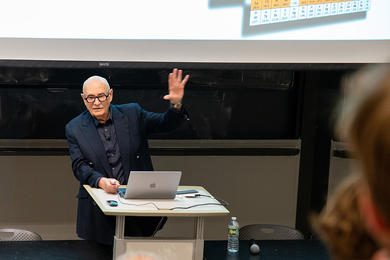While most role-playing games (RPGs) ask players to step into the shoes of an orc, level up and collect stats, RPGs haven’t asked players to take on actual roles — to act, to improvise, to explore motives and language and even go off-script.
Improviso, a first-of-its-kind RPG produced by a team at the Singapore-MIT GAMBIT Game Lab and released this week, changes that.
“My interest is in establishing new genres of games,” said Improviso creator Jeff Orkin, an artificial intelligence researcher who led the GAMBIT team and is based at the MIT Media Lab, working under Professor Deb Roy. “We have this popular genre of role-playing games, but Improviso is really about role-playing like you did were you were little: pretend play.”
The game explores how ordinary people can engage in dramatic improv. Lasting about 15 minutes, each scene connects two players: a lead actor and a director who controls up to four other characters. These characters interact behind paper masks in an ultra-low-budget movie set around an alien encounter.
Improviso Trailer from improviso on Vimeo
For Orkin's PhD thesis, he is developing an artificial-intelligence system that generates character behavior and dialogue based on the data captured from the improvised interactions of thousands of players. (Improviso is a spin-off of an earlier project called The Restaurant Game, where Orkin recorded 16,000 people playing the roles of customers and waitresses in a virtual restaurant.)
Improviso was made by Orkin and his team during GAMBIT’s summer program, when dozens of the world’s (in particular, Singapore’s) brightest students spend two months at MIT creating video games that tackle key research questions. GAMBIT’s Andrew Grant served as game director.
“The GAMBIT summer program is this great thing,” Orkin said. “You can have this very experimental idea, and you have this team for free to build it and try to learn from it.” About the challenges Improviso presented, Orkin said that it’s tough not to overwhelm players who aren’t big gamers. GAMBIT summer games tend to be variations on established game genres: puzzle games, adventure games, side-scrolling platformers. Orkin said that one Improviso tester’s reaction that “Hey, it’s paper Halo!” was a sign that gamers have certain expectations that are hard to subvert.
Nevertheless, Orkin was ecstatic about his team’s work. “It’s the second time I’ve worked with GAMBIT on a summer project. Both times I’ve been really impressed. They bring over these great students. We had three artists, two programmers, an audio person, a QA [quality assurance] person and a producer.” Most of his team were students from Singapore, while one member was from the Rhode Island School of Design who, just after the summer program, landed a game industry job at Subatomic Studios.
Orkin has been working with Department of Electrical Engineering and Computer Science master’s student Tynan Smith to continue polishing Improviso up to its release this week.
Orkin was especially pleased with recent reactions. “One tester said, ‘This could be a game. I mean like a game game. Like a Will Wright kind of game!”
Improviso is available for download (on Windows) at http://gambit.mit.edu/improviso.
Improviso, a first-of-its-kind RPG produced by a team at the Singapore-MIT GAMBIT Game Lab and released this week, changes that.
“My interest is in establishing new genres of games,” said Improviso creator Jeff Orkin, an artificial intelligence researcher who led the GAMBIT team and is based at the MIT Media Lab, working under Professor Deb Roy. “We have this popular genre of role-playing games, but Improviso is really about role-playing like you did were you were little: pretend play.”
The game explores how ordinary people can engage in dramatic improv. Lasting about 15 minutes, each scene connects two players: a lead actor and a director who controls up to four other characters. These characters interact behind paper masks in an ultra-low-budget movie set around an alien encounter.
Improviso Trailer from improviso on Vimeo
For Orkin's PhD thesis, he is developing an artificial-intelligence system that generates character behavior and dialogue based on the data captured from the improvised interactions of thousands of players. (Improviso is a spin-off of an earlier project called The Restaurant Game, where Orkin recorded 16,000 people playing the roles of customers and waitresses in a virtual restaurant.)
Improviso was made by Orkin and his team during GAMBIT’s summer program, when dozens of the world’s (in particular, Singapore’s) brightest students spend two months at MIT creating video games that tackle key research questions. GAMBIT’s Andrew Grant served as game director.
“The GAMBIT summer program is this great thing,” Orkin said. “You can have this very experimental idea, and you have this team for free to build it and try to learn from it.” About the challenges Improviso presented, Orkin said that it’s tough not to overwhelm players who aren’t big gamers. GAMBIT summer games tend to be variations on established game genres: puzzle games, adventure games, side-scrolling platformers. Orkin said that one Improviso tester’s reaction that “Hey, it’s paper Halo!” was a sign that gamers have certain expectations that are hard to subvert.
Nevertheless, Orkin was ecstatic about his team’s work. “It’s the second time I’ve worked with GAMBIT on a summer project. Both times I’ve been really impressed. They bring over these great students. We had three artists, two programmers, an audio person, a QA [quality assurance] person and a producer.” Most of his team were students from Singapore, while one member was from the Rhode Island School of Design who, just after the summer program, landed a game industry job at Subatomic Studios.
Orkin has been working with Department of Electrical Engineering and Computer Science master’s student Tynan Smith to continue polishing Improviso up to its release this week.
Orkin was especially pleased with recent reactions. “One tester said, ‘This could be a game. I mean like a game game. Like a Will Wright kind of game!”
Improviso is available for download (on Windows) at http://gambit.mit.edu/improviso.






